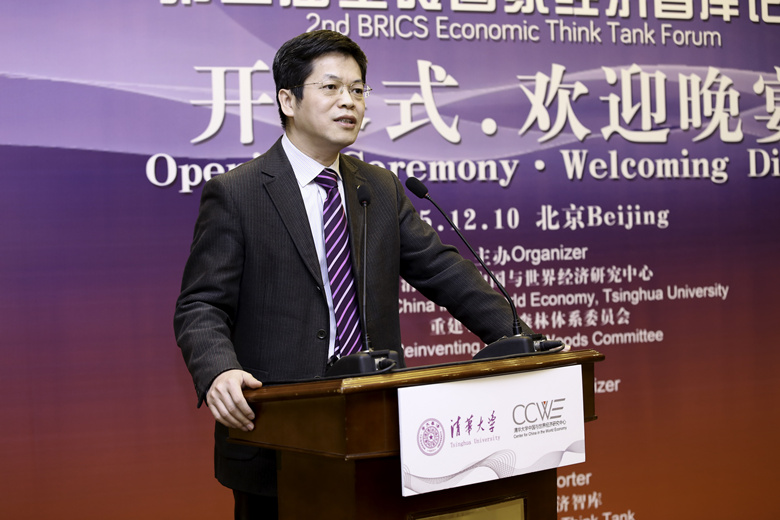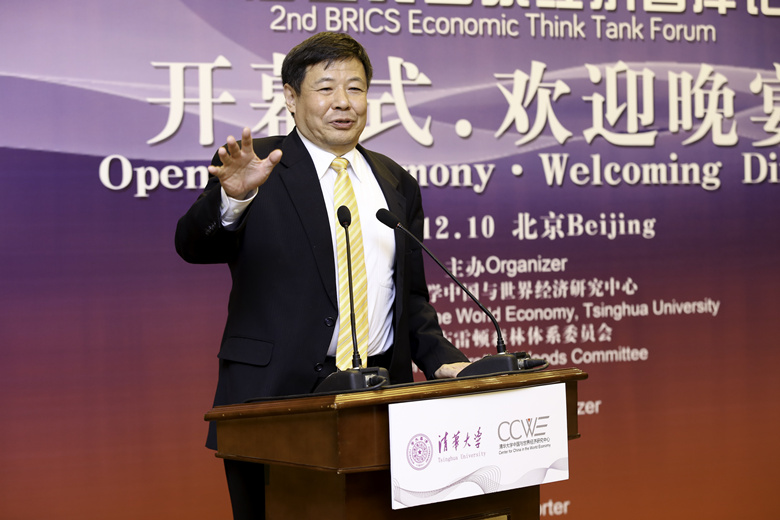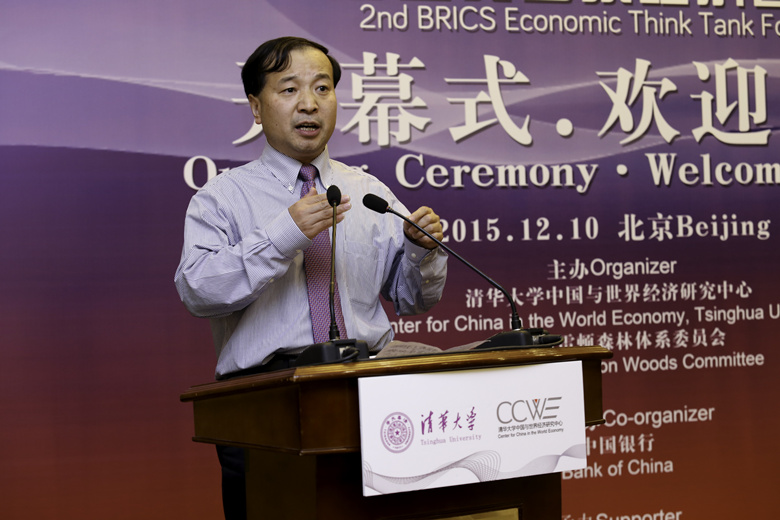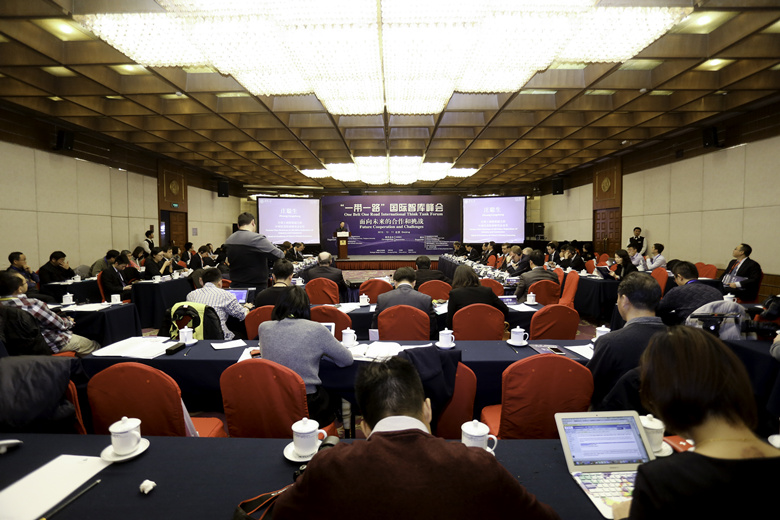"One Belt One Road" International Think Tank Summit Held Successfully in Beijing
Organized by the Center for China in the World Economy (CCWE) of Tsinghua University and the Reinventing Bretton Woods Committee, co-organized by the Bank of China (BOC) and jointly hosted by the BRICS Economic Think Tank, Euro-Asia Economists Think Tank, Kazakhstan G-Global International Secretariat, and CBNRI, the “One Belt One Road” (OBOR) International Think Tank Summit & 2nd BRICS Economic Think Tank Forum were held at the Capital Hotel in Beijing from December 10 to 12, 2015 with the theme of “Future Cooperation and Challenges.”Chinese government officials and top scholars concerned with the OBOR Initiative arrived in Beijing for the event with approximately 100 distinguished guests from all over the world.
Chaired by Professor David Daokui Li, Director of CCWE and Dean of Schwarzman Scholars at Tsinghua University, the summit received a speech by Deng Wei, Deputy Secretary of CPC Committee at Tsinghua University, keynote speeches from Zhu Guangyao, Vice Minister of Finance, and Zhu Xian, Vice President of BRICS New Development Bank, as well as the presence and speeches of Zhang Xiaoqiang, former Vice Chairman of National Development and Reform Commission (NDRC) and Executive Vice Chairman of China Center for International Economic Exchanges (CCIEE). Zhuang Congsheng, former Vice Chairman of All-China Federation of Industry and Commerce (ACFIC) and President of China Private Economy Academy, Zhang Yansheng, Secretary-General of NDRC Academic Committee, Guo Xian’gang, Vice President of China Institute of International Studies and Executive Director of the OBOR Initiative Research Center, Li Gang, Vice President of the Chinese Academy of International Trade and Economic Cooperation (CAITEC) of the Ministry of Commerce, Patrick Haverman, Deputy Country Director UNDP China, and Marc Uzan, Executive Director and Founder of the Reinventing Bretton Woods Committee, were all present, among others.
Deng Wei said firstly at the welcome dinner and opening ceremony of the summit on December 10 that the OBOR Initiative is able to become a major international topic not just because it is an important blueprint put forward by the Chinese leadership, but also more for its adaptation to the new historical trend for economy and finance to interrelate all countries, nations, and regions with each other closely in the course of globalization. Tsinghua University works to build up a top-level think tank under this important blueprint and plays a proactive role, facing strategic needs of the country and being bold to take responsibilities.

Deng Wei, Deputy Secretary of the CPC Committee at Tsinghua University.
Mr. Zhu Guangyao, Vice Minister of Finance, followed with a speech in which he noted that, from an international point of view, peace and development remain the mainstream of the world; from a domestic perspective, all Chinese people are engaged in achieving the two “first-century” goals under the leadership of the Chinese Communist Party with Mr. Xi Jinping as General Secretary; and from the perspective of history, the Silk Road was a “bridge of peace” between China and the world, through which Zheng He had made seven voyages to the west and five transits through Malacca Strait with Chinese silk, tea, chinaware and culture to be known to the world. All these constitute an important background for the implementation of the OBOR Initiative, which is not only in the interests of China but aligns with the benefits of other countries. All sides will profit from it and achieve win-win cooperation.

Zhu Guangyao, Vice Minister of Finance.
Zong Liang, Vice Director of BOC International Finance Research Institute, said that the world is now experiencing three major problems, i.e., the market, finance, and rules, to which the OBOR Initiative has been responsive in a pretty good manner. The Initiative has developed a huge new market and will work as a significant driving force for economic development. In the context of its globalization, RMB will provide additional global liquidity. Keeping faith with the concepts of peace, opening, win-win, and inclusiveness. Moreover, the OBOR Initiative can innovate the distribution rules for a more reasonable distribution of benefits.

Zong Liang, Vice Director of BOC International Finance Research Institute.
The formal meeting on December 11 started with the speech from Zhang Xiaoqiang, former Vice Chairman of the NDRC and Executive Vice Chairman of CCIEE. Zhang said that, firstly, the OBOR Initiative is needed by all. In the general background of weak economic revival, uneven development, and other outstanding problems at present, the Initiative works to contribute to peace and development as well as collaborated efforts to tackle major global challenges with new concepts and in new ways so as to achieve the common needs; secondly, the OBOR Initiative should work to improve civilization and harmonious coexistence. It advocates for a focus on the promotion of sustained, healthy economic development of the nations concerned and realization of inclusion, coexistence and exchanges among different civilizations, which will lay a solid foundation for peace; thirdly, the OBOR Initiative is an effective approach to innovative cooperation and development. With economic development as its very first quintessence, the Initiative focuses on achievement in five aspects, i.e., policy communication, facility interconnectivity, trade accessibility, fund accommodation, and interconnected aspirations of people; and lastly, the efforts under the OBOR Initiative will not succeed without the full participation of people of all countries concerned. They should work together towards the common vision of peace, development, and prosperity.
Zhuang Congsheng, former Vice Chairman of ACFIC and President of China Private Economy Academy, elaborated on the six basic patterns in the participation of China’s private enterprises in the efforts toward the OBOR Initiative and on five potential risks. The six basic patterns include: firstly, the pattern of capacity cooperation agreement, which means to avoid trade barriers, reduce costs, transfer manufacturing capacity and acquire competitive edge mainly through overseas investment projects; secondly, the trade-oriented or park-based pattern, which means to allow more enterprises to go abroad jointly and participate in the efforts towards the OBOR Initiative mainly by creating industrial parks and establishing trade zones; thirdly, the pattern of mergers and acquisitions, which means to obtain technology, management, market, and other factors mainly through offshore mergers and acquisitions as well as cooperative reorganization and to increase the competitiveness of the enterprises rapidly; fourthly, the pattern focused on resource development, which means to expand the space for enterprises to grow by acquiring extended industrial chains abroad, including minerals, agriculture, forestry, fishery and animal husbandry, and so on; fifthly, the pattern to avail advantages in funds, technology, gold-medal products, etc., to go abroad for greater space to develop and compete via proprietary brands, e.g., HUAWEI, among others; and sixthly, to promote commerce and trade and stimulate products and technologies by undertaking oversea engineering projects and labor cooperation programs. Five risks mainly include political, diplomatic, legal, exchange rate, and cultural risks.
Zhuang’s speech was succeeded by an elaboration from Zhang Yansheng, Secretary-General of the NDRC Academic Committee, on the development concept of the OBOR Initiative and production of reference cases, such as the TOD mode, for the patterns under the Initiative and its cooperation focuses. As far as the development concept is concerned, Mr. Zhang believes that, firstly, the OBOR Initiative is a new cooperation pattern with equal development as its theme; secondly, the Initiative is a harmonious yet different, inclusive new cooperation concept; and lastly, it is a development concept which focuses on shared development.
Mr. Guo Xian’gang, Vice President of China Institute of International Studies and Executive Director of the OBOR Initiative Research Center, then delivered a speech focused on the four major risks to overcome in efforts towards the OBOR Initiative. He said that the successful takeoff of the Initiative was mainly a result of China’s economic and technological strength and that four types of risks, i.e., safety risks, legal risks, and the political and financial risks in countries and regions concerned, are possible in advancing the Initiative, though. To tackle these risks, it is important to reinforce studies and risk evaluations on the safety, political trends as well as the legal and financial situation of these countries and regions, to strengthen safety moves to protect the Chinese enterprises and companies engaged in construction programs and doing business in these courtiers, to enhance training of personnel to be working in these countries and to stand on solid ground and push the OBOR Initiative forward in a steady manner.
Mr. Li Gang, Vice President of CAITEC MOC, said in his speech that the potential is tremendous for future cooperation, especially cooperation in trade and investment, between China and nations engaged in the OBOR Initiative and that further efforts are needed to explore greater space for these fields and to incorporate organically integrated trade and investment into the development of economy and trade in efforts to achieve policy communication, facility interconnectivity, trade accessibility, fund accommodation, and interconnected aspirations of people, which requires that, firstly, vigorous actions be taken to develop the trade of tangible goods and create more points of growth; secondly, space for the trade of services be expanded in the joint efforts towards the OBOR Initiative; thirdly, the process of trade facilitation be improved strongly in the OBOR Initiative nations for reduced transaction costs; fourthly, measures be taken to broaden and reinforce cooperation in the field of investment and to channel abroad China’s enterprises in sectors with traditional superiorities, such as the light industry, textile, construction materials, among others, and equipment manufacturers; and fifthly, regional economic integration be improved.
Patrick Haverman, Deputy Country Director UNDP China, said that the development of the OBOR Initiative is exciting in that the Initiative could not only facilitate the realization of the goals of countries concerned in infrastructure and regional development, etc. but also actively promote positive results in reducing poverty, environmental sustainability, and inclusive social development. He pointed out, however, that social and environmental standards should be taken into account in making investments under the OBOR Initiative to ensure clean, green, and highly-efficient investments.
Marc Uzan, Executive Director and Founder of the Reinventing Bretton Woods Committee, provided an interpretation of the OBOR Initiative from the perspective of the international financial system. He believes the Initiative allows China to integrate into the international economic system more effectively in financial terms and will enable better integration of China with the west. Besides, the founding of the Asian Infrastructure Investment Bank reflected China’s needs for investment, with technical investment in particular, which contributes to improving the ongoing financial systems and orders. It is a question of extraordinarily critical importance in the international financial system how the financial system led by China to conduct desirable cooperation with its U.S. counterpart for mutual promotion and complementation.

The OBOR International Think Tank Summit attracted attention from a great number of well-known media from China and abroad, with IFENG.COM, Guangming Daily, and finance.sina.com.cn presenting the full-range live broadcast and Xinhua News Agency, People’s Daily, CCTV, China Business Network, New York Times, 21st Century Business Herald, Capital Week, China Economic Herald, Wen Wei Po, Ta Kung Pao, Economic Information Daily, Observer Review, Xinhua News Agency Outlook, Financial News, Wharton Business Review, China News Service, Jiemian News, Foreign Investment in China Magazine and Russia’s Alpha TV took part in reporting on the event.




